|
 Secure Site
Secure Site
|
 |
Archive for the 'Sleep Habits' Category
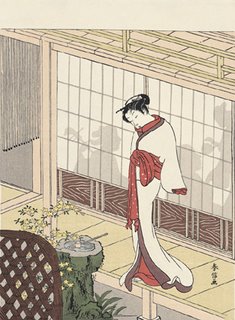 harunobu suzuki, Beauty at the Veranda
For most women who chronically bump along on near empty, it’s no mystery that getting to bed a little earlier would help. “The sleep system really does work like a bank,” says William Dement, MD, PhD, who—as chief of the sleep medicine division at the Stanford University School of Medicine—should know. “We can keep going for a long time on borrowed energy because our survival mechanisms kick in. At some point, however, every hour lost needs to be paid back.” But instead of the pillow, we’ll often reach for coffee—37 percent of American women chug more than three caffeinated beverages a day, according to the National Sleep Foundation—or a glass of wine, or something sweet, or the remote control to “wind down” with Anderson Cooper, who’s inevitably reporting from a war zone with things blowing up in the background. None of these efforts restores energy—some, in fact, do the opposite. Even when you do finally climb into bed, there are times when anxiety invades your sleep, leaving you bleary-eyed and dragging day after day. So we decided to investigate what—short of permanent residency at a spa—gives you a real rest.
Paradoxically, according to the newest research, when you’re looking for a profound rest cure, rather than trying to tune out, you may be better off tuning in and anchoring your awareness in the present moment. You can approach such engagement through various routes, like fully using your senses, practicing mindfulness, getting into a flow state, and—most difficult for many, but perhaps most effective—giving up the need to be in control.
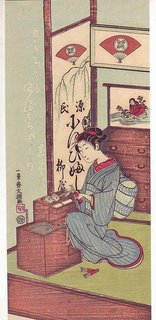 tune in Loch Kelly, A New York Buddhist-trained psychotherapist and meditation teacher, uses a technique called “resting in the heart space” to help people relinquish the reins; in his experience it provides the deepest rest in the shortest amount of time. “Traditionally, meditation focuses on getting to a state so neutral that there isn’t a problem to solve. Some monks spend 20 years in isolation working on just that.” But anyone, Kelly claims, can attain a sense of flow—and many of us already do through ordinary activities like gardening, knitting, working, or driving. When you’re in a car, for example, you have to focus on the road as it looks in the moment and, at the same time, stay alert to continually anticipate the next move. Eventually, your brain resolves the two directions it’s working in by falling into a rhythm, which leads to an open state of awareness that Kelly calls flow. You’re most likely to feel it after an unfettered drive in the country—no urgent sense of time passing or future demands impinging, but rather a merging into the current, a harmony with the environment as the present unfolds. “There’s something that’s unhooked from the mind, prior to thought, and at the same time intelligent,” Kelly says. “You can respond quickly.” Entering this flow state signals the brain that you’re safe, not in danger mode.
Once you’ve gotten a sense of what flow is, you’re ready for the heart space meditation. Kelly suggests deciding ahead of time how long you can allow yourself to rest—people usually do it from one to 20 minutes, but you may want to go longer. To prepare, take a big inhalation, filling your stomach from the bottom to the top like a water pitcher. Exhale as you normally would. Next, look up and gradually allow your peripheral vision to expand, a gesture intended to keep you engaged with your surroundings. Smile to tell yourself that you’re doing something you enjoy.
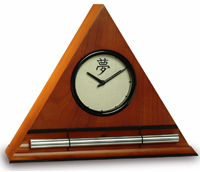 get the rest you need
Boulder, Colorado—an innovative company has taken one of life’s most unpleasant experiences (being startled awake by your alarm clock early Monday morning), and transformed it into something to actually look forward to. “The Zen Alarm Clock,” uses soothing acoustic chimes that awaken users gently and gradually, making waking up a real pleasure. Rather than an artificial recorded sound played through a speaker, the Zen Clock features an alloy chime bar similar to a wind chime. When the clock’s alarm is triggered, its chime produces a long-resonating, beautiful acoustic tone reminiscent of a temple gong. Then, as the ring tone gradually fades away, the clock remains silent until it automatically strikes again three minutes later. The frequency of the chime strikes gradually increase over ten-minutes, eventually striking every five seconds, so they are guaranteed to wake up even the heaviest sleeper. This gentle, ten-minute “progressive awakening” leaves users feeling less groggy, and even helps with dream recall.
By Sara Reistad-Long
O, The Oprah Magazine
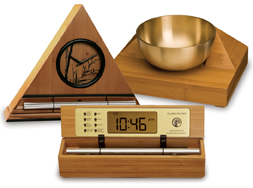 Now & Zen's Family of Alarm Clocks
Now & Zen’s Chime Alarm Clock Shop
1638 Pearl Street
Boulder, CO 80302
(800) 779-6383
Posted in Bamboo Chime Clocks, Chime Alarm Clocks, Natural Awakening, sleep, Sleep Habits
 trouble sleeping? By John D. Sutter, CNN
There’s growing concern that the glowing screens of laptops and the iPad may affect sleep if used right before bedtime.
J.D. Moyer decided recently to conduct a little experiment with artificial light and his sleep cycle.
The sleep-deprived Oakland, California, resident had read that strong light — whether it’s beaming down from the sun or up from the screens of personal electronics — can reset a person’s internal sleep clock.
So, for one month, whenever the sun set, he turned off all the gadgets and lights in his house — from the bulb hidden in his refrigerator to his laptop computer.
It worked. Instead of falling asleep at midnight, Moyer’s head was hitting the pillow as early as 9 p.m. He felt so well-rested during the test, he said, that friends remarked on his unexpected morning perkiness.
“I had the experience, a number of times, just feeling kind of unreasonably happy for no reason. And it was the sleep,” he said. “Sure, you can get by with six or seven hours, but sleeping eight or nine hours — it’s a different state of mind.”
Moyer may be onto something.
More than ever, consumer electronics — particularly laptops, smartphones and Apple’s new iPad — are shining bright light into our eyes until just moments before we doze off.
Now there’s growing concern that these glowing gadgets may actually fool our brains into thinking it’s daytime. Exposure can disturb sleep patterns and exacerbate insomnia, some sleep researchers said in interviews.
“Potentially, yes, if you’re using [the iPad or a laptop] close to bedtime … that light can be sufficiently stimulating to the brain to make it more awake and delay your ability to sleep,” said Phyllis Zee, a neuroscience professor at Northwestern University and director of the school’s Center for Sleep & Circadian Biology.
“And I think more importantly, it could also be sufficient to affect your circadian rhythm. This is the clock in your brain that determines when you sleep and when you wake up.”
Such concerns are not entirely new: One sleep researcher said Thomas Edison created these problems when he invented the light bulb.
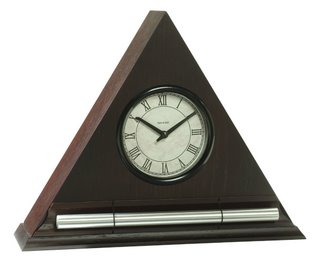 Zen Alarm Clocks Choosing an alternative to your i Pad alarm clock just may help to sleep better.
“The Zen Alarm Clock,” uses soothing acoustic chimes that awaken users gently and gradually, making waking up a real pleasure. Rather than an artificial recorded sound played through a speaker, the Zen Clock features an alloy chime bar similar to a wind chime. When the clock’s alarm is triggered, its chime produces a long-resonating, beautiful acoustic tone reminiscent of a temple gong. Then, as the ring tone gradually fades away, the clock remains silent until it automatically strikes again three minutes later. The frequency of the chime strikes gradually increase over ten-minutes, eventually striking every five seconds, so they are guaranteed to wake up even the heaviest sleeper. This gentle, ten-minute “progressive awakening” leaves users feeling less groggy, and even helps with dream recall.
In the morning, its exquisite sounds summon your consciousness into awakening with a series of subtle gongs that provide an elegant beginning to your day. Once you experience the Zen Timepiece’s progressive awakening, you’ll never want to wake up any other way.
 Zen Alarm Clock Shop - Boulder, Colorado Now & Zen’s Clock Store
1638 Pearl Street
Boulder, CO 80302
(800) 779-6383
Posted in Natural Awakening, Now & Zen Alarm Clocks, sleep, Sleep Habits
 Sanmonji, sleeping cat Perfect alarm clock gift makes waking up a calming and relaxing experience
Replace Your Loved Ones Alarm Clock, so that you don’t have to be awakened by their Frightening, Beeping Alarm Clock…
Are you tired of your husbands alarm clock?
What makes this gentle awakening experience so exquisite is the sound of the natural acoustic chime, which has been tuned to produce the same tones as the tuning forks used by musical therapists. According to the product’s inventor, Steve McIntosh, “once you experience this way of being gradually awakened with beautiful acoustic tones, no other alarm clock will ever do.”
Boulder, Colorado—an innovative company has taken one of life’s most unpleasant experiences (being startled awake by your alarm clock early Monday morning), and transformed it into something to actually look forward to. “The Zen Alarm Clock,” uses soothing acoustic chimes that awaken users gently and gradually, making waking up a real pleasure. Rather than an artificial recorded sound played through a speaker, the Zen Clock features an alloy chime bar similar to a wind chime. When the clock’s alarm is triggered, its chime produces a long-resonating, beautiful acoustic tone reminiscent of a temple gong. Then, as the ring tone gradually fades away, the clock remains silent until it automatically strikes again three minutes later. The frequency of the chime strikes gradually increase over ten-minutes, eventually striking every five seconds, so they are guaranteed to wake up even the heaviest sleeper. This gentle, ten-minute “progressive awakening” leaves users feeling less groggy, and even helps with dream recall.
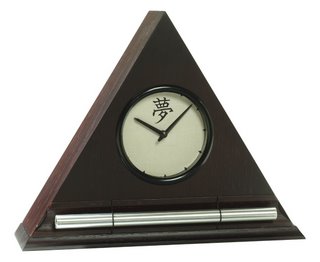 zen alarm clocks for a peaceful awakening Now & Zen’s Clock Store
1638 Pearl Street
Boulder, CO 80302
(800) 779-6383
Posted in Bamboo Chime Clocks, Now & Zen Alarm Clocks, Progressive Awakening, sleep, Sleep Habits, Well-being
 getting enough shut-eye? Children and Sleep: Is Your Child Getting Enough Shut-Eye?
How to tell if your child is not getting enough sleep
For many active school-aged children, sleep can be as hard to come by as it is for busy adults. After-school activities, homework, and playtime with family and friends can all lead to a packed schedule. Add to that the lure of electronics such as TV, computers and videogames, and you have the makings of chronic sleep deficit in kids.
Since school-aged children need between 10 to 11 hours of sleep, parents must be vigilant about enforcing bedtimes, setting up good sleep routines, and watching for signs of fatigue in their children. It’s especially important for school-aged kids to get enough rest. For one thing, one of the factors that can reduce one’s immune system’s ability to fight off infections is not getting enough sleep, and as we know, kids in school are constantly exposed to transmittable illnesses such as colds from classmates. Lack of sleep in children has also been associated with health problems ranging from obesity to mood swings, as well as cognitive problems that can have an impact on a child’s ability to concentrate, pay attention, and learn in school.
Signs of Sleep Deprivation in Children
If you think your child might not be getting enough sleep, look for these signs that she is not getting the amount of sleep she needs. Your child is sleep deprived if she:
- Has trouble waking up in the morning
- Exhibits irritable behavior
- Seems overly emotional and moody
- Is hyperactive
- Has difficulty concentrating in school
- Has trouble staying awake during the day
If you see signs of sleep deficit in your child, try setting up some good nighttime sleep routines and healthy sleep habits to help your child get the amount of rest she needs to be at her best both at home and at school.
Remember that waking up in the morning should be as pleasant as falling asleep at night. The Zen Alarm Clock’s gradual, gentle awakening is transformative.
The Zen Clock’s long-resonating Tibetan bell-like chime makes waking up a beautiful experience – its progressive chimes begin your day with grace.
When the clock’s alarm is triggered, the acoustic chime bar is struck just once … 3-1/2 minutes later it strikes again … chime strikes become more frequent over 10 minutes … eventually striking every 5 seconds until shut off. As they become more frequent, the gentle chimes will always wake you up – your body really doesn’t need to be awakened harshly, with a Zen Clock you’re awakened more gradually and thus more naturally.
Waking up in the morning should be as pleasant as falling asleep at night. The Zen Alarm Clock’s gradual, gentle awakening is transformative.
Waking up in the morning should be as pleasant as falling asleep at night. The Zen Alarm Clock’s gradual, gentle awakening is transformative.
By Katherine Lee, About.com Guide
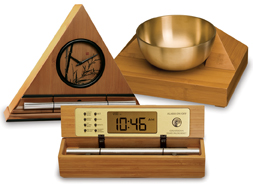 Enhance your sleep rituals by getting the most soothing alarm clock Now & Zen’s Headquarter Clock Shop
1638 Pearl Street
Boulder, CO 80302
(800) 779-6383
 The Zen Alarm Clock Store in Boulder, CO
Posted in Bamboo Chime Clocks, Natural Awakening, sleep, Sleep Habits
 wake up and do something How to Fight the Urge to Sleep Too Much
Not getting enough sleep can sometimes be a bad thing. But did you know that getting too much sleep is just as bad?
One Solution: Wake up and do something. Once you’ve done your routine, get moving. Walk to work, or if you drive, park a bit out and take the stairs up. On the weekend, you can go for a walk or vacuum. Whatever you do, get your blood moving. It’ll let you clear mental cobwebs left by sleep and settle into wakefulness.
Boulder, Colorado—an innovative company has taken one of life’s most unpleasant experiences (being startled awake by your alarm clock early Monday morning), and transformed it into something to actually look forward to. “The Zen Alarm Clock,” uses soothing acoustic chimes that awaken users gently and gradually, making waking up a real pleasure. Rather than an artificial recorded sound played through a speaker, the Zen Clock features an alloy chime bar similar to a wind chime. When the clock’s alarm is triggered, its chime produces a long-resonating, beautiful acoustic tone reminiscent of a temple gong. Then, as the ring tone gradually fades away, the clock remains silent until it automatically strikes again three minutes later. The frequency of the chime strikes gradually increase over ten-minutes, eventually striking every five seconds, so they are guaranteed to wake up even the heaviest sleeper. This gentle, ten-minute “progressive awakening” leaves users feeling less groggy, and even helps with dream recall.
What makes this gentle awakening experience so exquisite is the sound of the natural acoustic chime, which has been tuned to produce the same tones as the tuning forks used by musical therapists. According to the product’s inventor, Steve McIntosh, “once you experience this way of being gradually awakened with beautiful acoustic tones, no other alarm clock will ever do.”
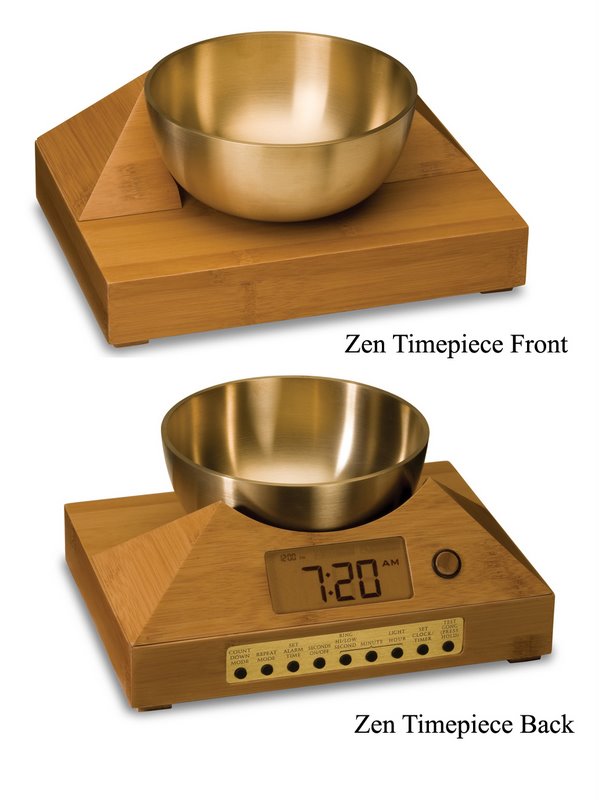 Zen Clocks will Peacefully Help You Awake Shop our Zen Clock Store
Now & Zen, Inc.
1638 Pearl Street
Boulder, CO 80302
(800) 779-6383
Posted in intention, Natural Awakening, sleep, Sleep Habits
 Waking Gently
Waking up in the morning is a metaphor for life — a kind of daily microcosmic reenactment of our overall purpose for being in the world. That is, just about every religious tradition emphasizes spiritual growth. And the connection between “awakening” and spiritual growth can be found in practically all forms of spiritual teaching.
So if waking up in the morning really is a metaphor for our larger spiritual lives, this perspective might help us treat our morning ritual of getting out of bed as a kind of spiritual practice. Indeed, when approached in this way, how we wake up in the morning can make a larger difference in our lives overall.
Perhaps this is stretching the matter, but there are many people who do recognize that something as simple as waking up in the morning can be an authentic form of spiritual practice. For those who don’t have to go to work or get the kids to school, waking up naturally, whenever their body feels like it, can be a wonderful version of this practice. Waking up without an alarm, whenever your body has had enough rest, is probably the healthiest option, and the one that will leave us feeling most refreshed and ready to start the day. However, there are few of us that have this luxury, especially during the week.
Fortunately, for those who want to wake up right, without being startled awake by an annoying alarm or some radio DJ, there is The Zen Alarm Clock. This clock was designed to make waking up a kind of spiritual practice. The Zen Clock wakes users with a built-in 10 minute gradual progression of acoustic chimes. And this gradual form of “progressive awakening” has been thoughtfully designed to include esoteric features that are fitting for a form of spiritual practice. For example, not only is the hardwood Zen Alarm Clock beautiful to see and hear, the clock’s chime is tuned to produce the same frequencies as the tuning forks used by musical therapists in their healing work. Moreover, the Zen Clock’s pre-programmed 10 minute chime progression sequence advances according to the “golden ratio,” which reflects both the natural proportions of our own bodies and the patterns of growth used in the overall evolution of the universe.
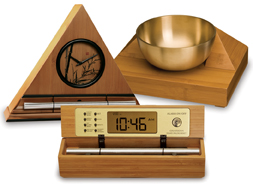 Family of Zen Alarm Clocks for a Peaceful Awakening
Now & Zen Clock Store
1638 Pearl Street
Boulder, CO 80302
(800) 779-6383
Posted in Bamboo Chime Clocks, Natural Awakening, sleep, Sleep Habits
 sleeping problems How to Fight Too Much Sleep
Not getting enough sleep can sometimes be a bad thing. But did you know that getting too much sleep is just as bad?
Set an alarm . It doesn’t have to be too early, just enough to get anywhere from 7-9 hours of sleep. Do this for at least a month and your body will get used to waking up at this time so you won’t have to use the alarm. Try not to hit to snooze button, however, it trains your body to stay tired in morning. If you have a coffee machine that will start at certain time automatically, set it so you can wake up to the scent of fresh brewed coffee.
Or just use an alarm clock that is not disruptive!
Fortunately, for those who want to wake up right, without being startled awake by an annoying alarm or some radio DJ, there is The Zen Alarm Clock. This clock was designed to make waking up a kind of spiritual practice. The Zen Clock wakes users with a built-in 10 minute gradual progression of acoustic chimes. And this gradual form of “progressive awakening” has been thoughtfully designed to include esoteric features that are fitting for a form of spiritual practice. For example, not only is the hardwood Zen Alarm Clock beautiful to see and hear, the clock’s chime is tuned to produce the same frequencies as the tuning forks used by musical therapists in their healing work. Moreover, the Zen Clock’s pre-programmed 10 minute chime progression sequence advances according to the “golden ratio,” which reflects both the natural proportions of our own bodies and the patterns of growth used in the overall evolution of the universe.
adapted from Wikihow.com
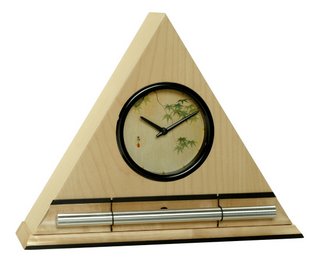 Chime Alarm Clock for a Gradual Awakening Now & Zen’s Chime Alarm Clock Store
1638 Pearl Street
Boulder, CO 80302
(800) 779-6383
Posted in Bamboo Chime Clocks, Natural Awakening, Now & Zen Alarm Clocks, Progressive Awakening, sleep, Sleep Habits
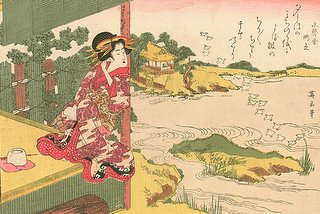 sleeping outside, a perfect place for dream time... There’s something irresistibly romantic about sleeping outside. Long a part of cowboy and camping traditions, it achieved architectural expression in the late 19th and early 20th centuries with the rise of the sleeping porch. The idea continues to evolve. Whether used for a daytime catnap or a full night’s rest, open-air sleeping platforms can give you a chance to enjoy summer weather to the fullest.
Garden sanctuary
As a child, Marni Leis wanted a backyard playhouse. She realized her dream as an adult by building what she calls her “teahouse.” The 6- by 13-foot screened pavilion occupies a wooden platform near a small pond. Gauzy curtains frame the entrance and provide privacy and bug protection when needed. A shallow gabled roof covered with translucent fiberglass shelters the area from rain and drizzle without blocking the light. A portable Digital Zen Alarm Clock sits on a basket table by the futon bed on the platform bed.
She furnished the space with comfortable, stylish pieces, including a chair found at a flea market, an old coffee table, and an antique bookcase. “I used fabrics I could wash easily, because they are exposed to the elements,” she says. “I also used pieces that meant something to me. These give the place an air of nostalgia. When you’re there, you feel like you could be in another time or place. It’s great to get outside away from the noise and be alone with nature.”
Boulder, Colorado—an innovative company has taken one of life’s most unpleasant experiences (being startled awake by your alarm clock early Monday morning), and transformed it into something to actually look forward to. “The Zen Alarm Clock,” uses soothing acoustic chimes that awaken users gently and gradually, making waking up a real pleasure. Rather than an artificial recorded sound played through a speaker, the Zen Clock features an alloy chime bar similar to a wind chime. When the clock’s alarm is triggered, its chime produces a long-resonating, beautiful acoustic tone reminiscent of a temple gong. Then, as the ring tone gradually fades away, the clock remains silent until it automatically strikes again three minutes later. The frequency of the chime strikes gradually increase over ten-minutes, eventually striking every five seconds, so they are guaranteed to wake up even the heaviest sleeper. This gentle, ten-minute “progressive awakening” leaves users feeling less groggy, and even helps with dream recall.
adapted from Sunset Magazine by Mary Jo Bowling
 Digital Zen Alarm Clocks, for a calm awakening Now & Zen’s Gentle Chime Alarm Clock Store
1638 Pearl Street
Boulder, CO 80302
Posted in Bamboo Chime Clocks, Chime Alarm Clocks, Japanese Inspired Zen Clocks, Natural Awakening, Now & Zen Alarm Clocks, Progressive Awakening, Sleep Habits
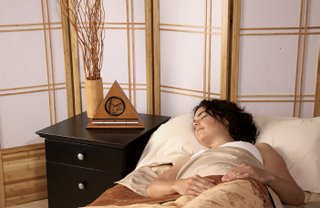 Sleep Issues Sleep Statistics
In 2008 the Centers for Disease Control and Prevention set out to learn just what determines how much sleep Americans get. The lowdown from the survey’s 403,981 respondents follows.
Women are more likely than men to get an insufficient amount of sleep. The results were 12.4 percent of women surveyed versus 9.9 percent of men.
Work helps you sleep. People who are employed get more rest than those who aren’t. But retirees get more sleep than either of those groups. (Only 9.5 percent of retired respondents reported not getting enough z’s.)
More education = more sleep. People with a college degree snooze more than those without a high school diploma or a GED.
Married and single people sleep roughly the same amount. But being divorced, widowed, or separated increases your likelihood of insufficient sleep.
Where you live affects your sleep. West Virginia has the highest rate of sleeplessness—more than 19 percent of respondents. For more sufficient sleep, head to North Dakota, where only 7.4 percent reported inadequate sleep.
The good news? The older you grow, the more likely you are to get enough sleep. People over the age of 65 reported the lowest percentage of insufficient sleep.
adapted from RealSimple.com
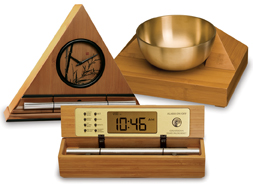 Zen Alarm Clocks Contribute to Good Sleep Habits Now & Zen Alarm Clock Store
1638 Pearl Street
Boulder, CO 80302
(800) 779-6383
Posted in Meditation Tools, mindfulness practice, Natural Awakening, sleep, Sleep Habits, wake up alarm clock
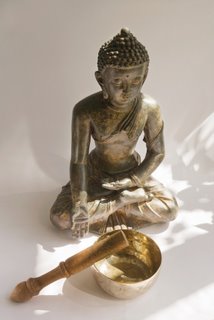 Carved Wooden Thai Buddha with Singing Bowl The Habit: Running Late
Why you do it: The nice reason? You’re a pleaser and an overdoer, packing too much in. Not so nice? Deep down, you may think your time is more important than the time of those waiting. Either way, you lack some essential time-management skills.
How to stop: When someone asks you to do something, don’t accept right away. Say you’ll get back to him, then decide whether you have the time. Also, figure out which tasks always seem to make you late. Maybe it’s drying your hair in the morning: Time yourself to see how long it takes, then allot enough time in your routine. Tricks: Set your Zen Timepiece with Gong Alarm five minutes fast and build in time for unexpected delays. And always call ahead if you’re running late. Not only is it gracious but the shame of making repeated calls might also be the incentive you need to be punctual.
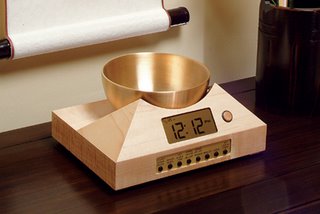 Now & Zen 1638 Pearl Street Boulder, CO 80302
Posted in Chime Alarm Clocks, Now & Zen Alarm Clocks, sleep, Sleep Habits
« Previous Page — « Previous Entries
Next Entries » — Next Page »
|
|
|
|